The Future of Breakfast
Sustainability
Plant-based options move to the center of the plate
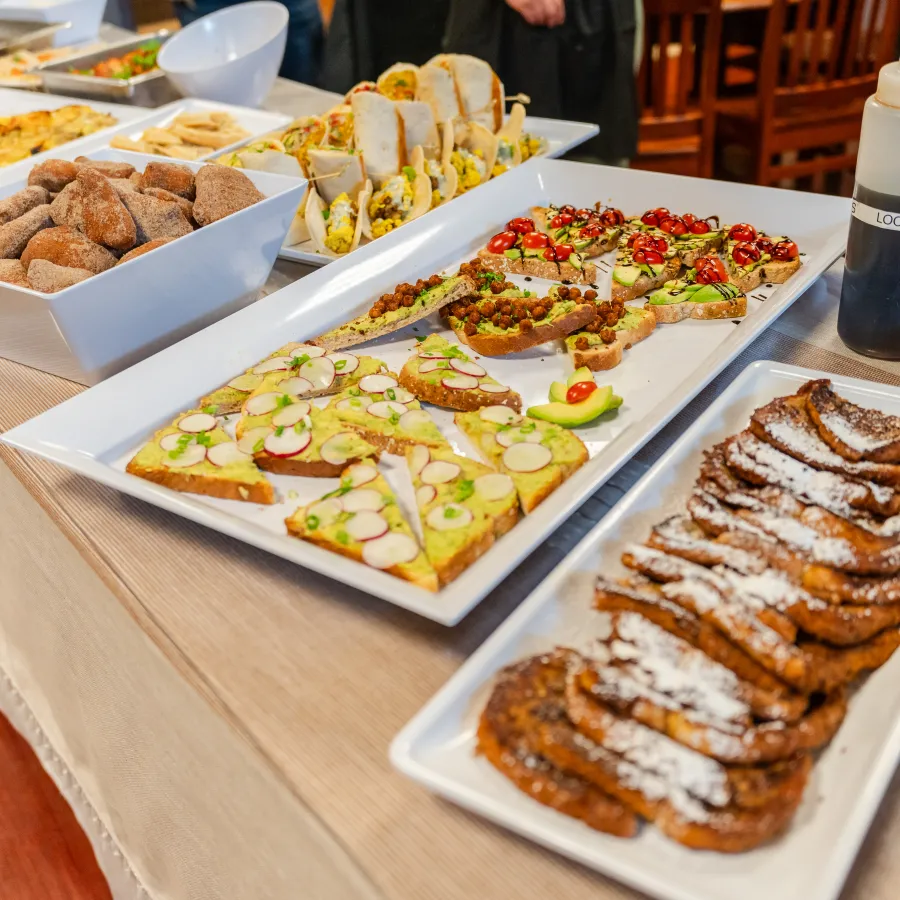
Published January 24, 2024
The new entrees start emerging from the kitchen in the early afternoon. First comes a deep-purple smoothie bowl topped with toasted granola and fresh berries. It‘s quickly followed by a tray of spicy chorizo shakshuka; a trio of banana, pumpkin, and ”homestyle“ pancakes; a pile of custard French toast dotted with powdered sugar; and a bowl heaped high with chai-scented and sugar-dusted mandazi, or fried bread.
Once the dishes—18 recipes and several variations—are displayed, Smith dining staff gather in front of chef Mohamed Alqamoussi, their trainer for the day. They give a quick round of feedback, load up their plates, and settle down in the otherwise-empty Chase-Duckett dining hall to sample the menu items.
Their opinions are important. Algamoussi, a culinary specialist with The Humane Society of the United States (HSUS), and fellow chefs developed the new plant-based breakfast recipes after several months of testing. While the recipes are available to the public, Smith was tapped as the first college team in the country to receive hands-on culinary training in preparing them.
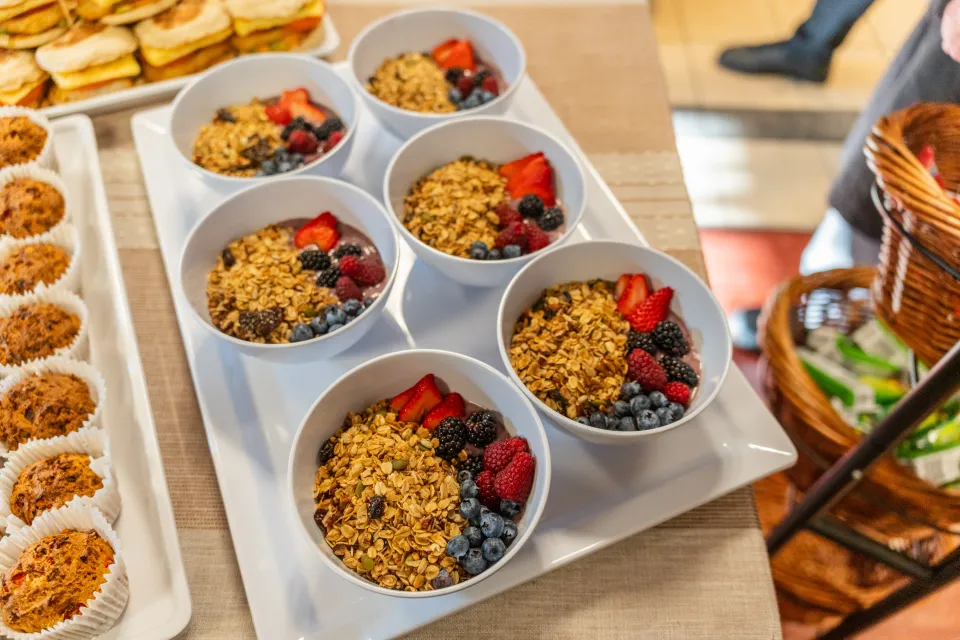
For extra oomph, the very berry smoothie bowl includes vegan vanilla protein powder. Photos by Jesse Gwilliam
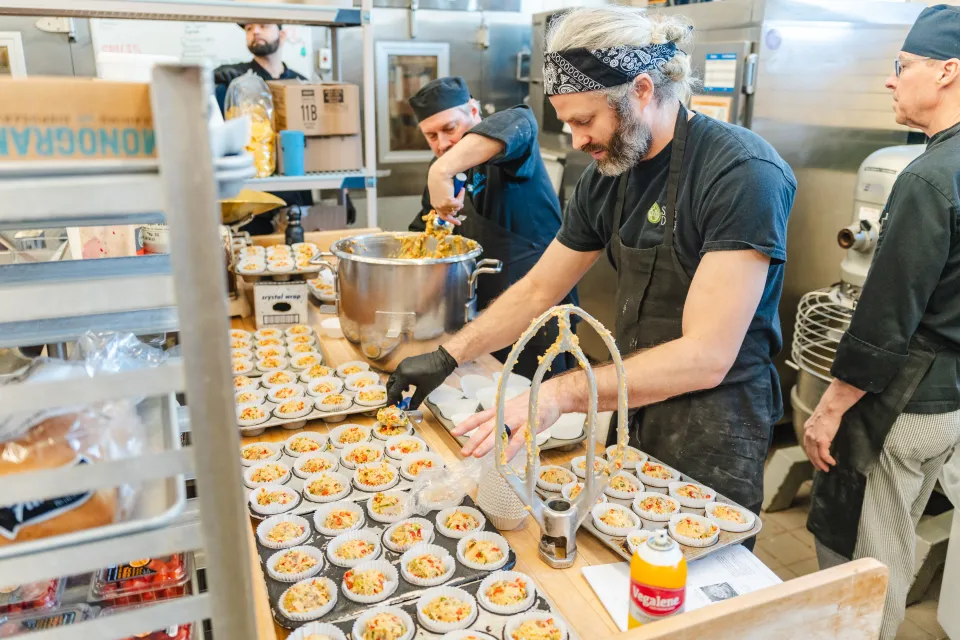
Smith's Caleb Murray prepares muffins with plant-based meat substitute and vegetables, "It definitely sounds interesting," he said. "I never thought of using Beyond Meat in the muffins.”
“When you’re trying to ‘veganize’ food for allergies or cultural or personal preferences, breakfast is tough,” said Dorrie Nang, a food service innovation specialist with the Humane Society who helped develop the program and was on hand for the recent campus training. “French toast, pancakes, sausage, eggs—that’s traditional.”
The new plant-based recipes had several goals: to feature a variety of healthy global cuisines, be cost-effective, and be flexible enough that they could be made in different variations, leaving out particular allergens. At Smith, the training was also part of a vetting process: Dishes that garnered both staff and student approval would be added to the campuswide database of recipes available for house dining halls.
”Smith College has been ahead of the curve for many years because their students want more plant-based foods,” said Nang. “When a place like Smith College makes that commitment, we help them.”
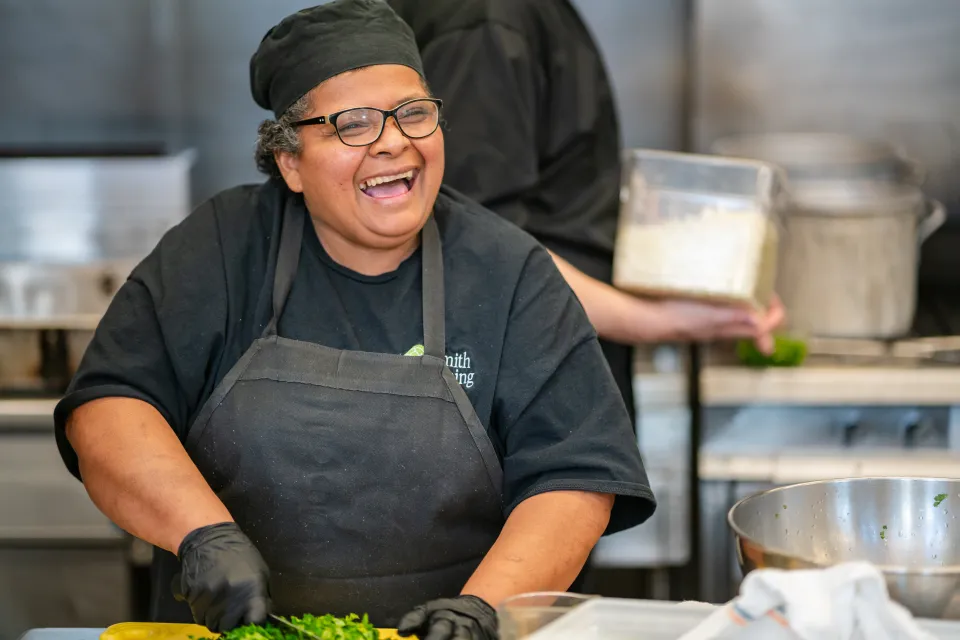
Chef Maria Aguilar chops vegetables for a vegan entree.
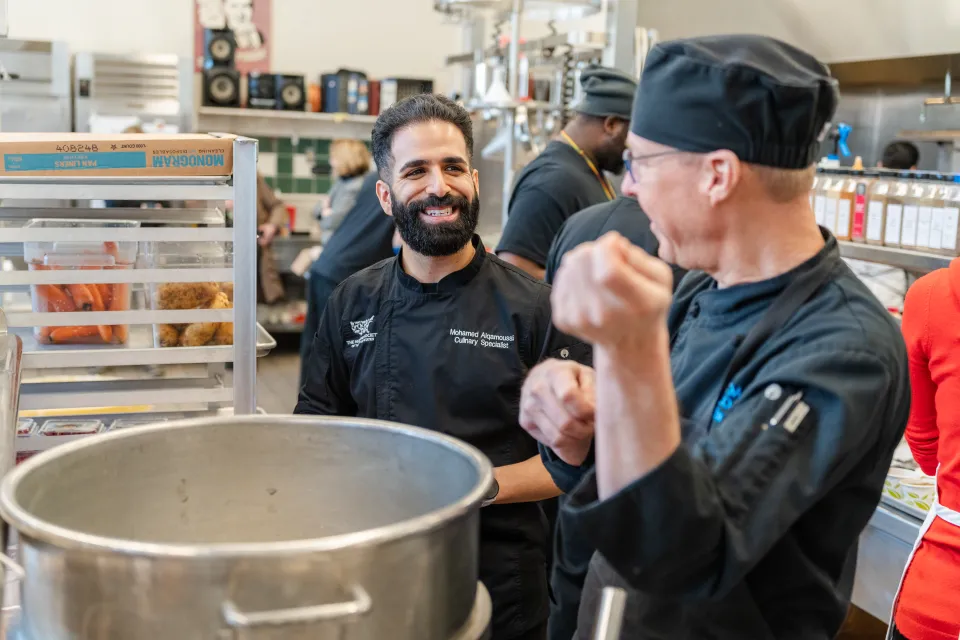
Chef Mohamed Alqamoussi of the Humane Society talks to Smith chef Tim Zima, who prepared the mandazi.
For the staff who had prepared and then sampled the food, rave reviews followed. “This is fire. Just fire,” said chef Chris Depault, tucking into a plate of golden tortang talong, or eggplant omelet.
“I’m not a big vegetarian eater,” said kitchen assistant Natfa (Mike) Grant, who works in Lamont House. “But to see something being made and taste it—and not notice the difference? That was big for me.”
The dishes had cleared their first hurdle: wide approval and admiration among the staff who made them. In the morning, they would face a greater test: What would students think when they tried this plant-based breakfast menu for the first time?
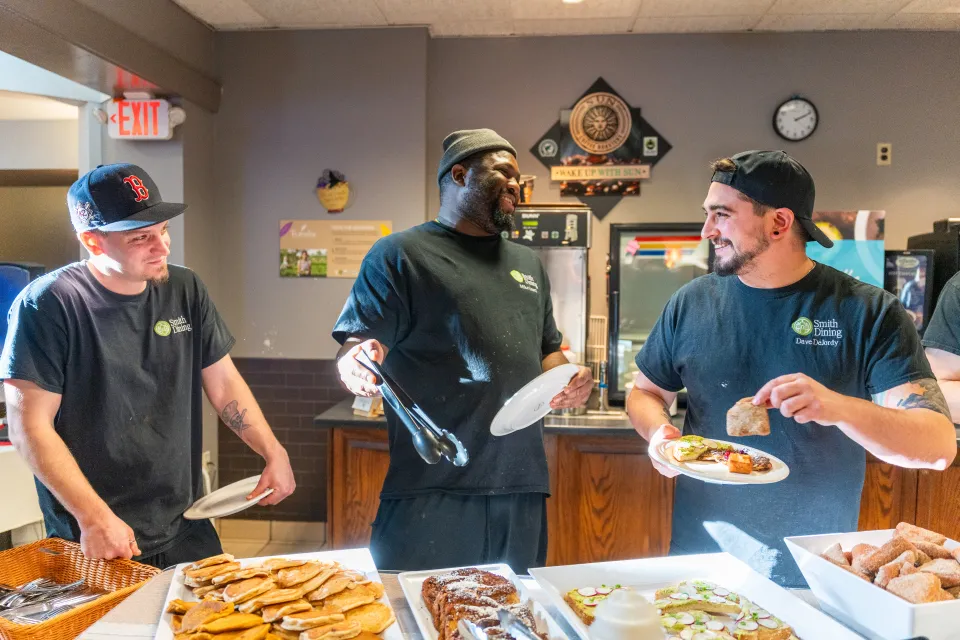
Chefs David DeJordy, Mike Grant, and Julian Martineau sample the new plant-based breakfast menu.
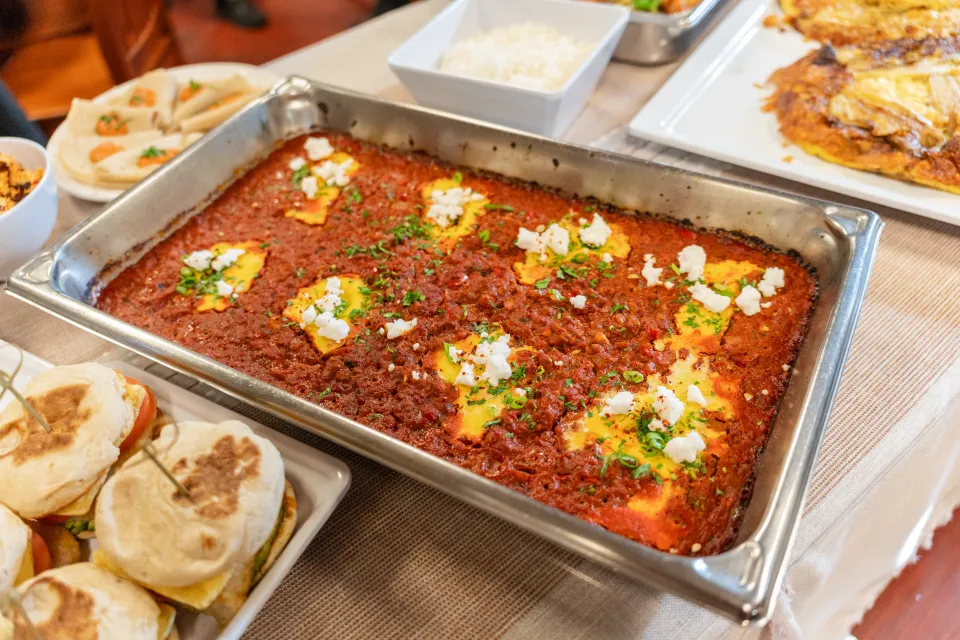
A tray of spicy chorizo shakshuka with Better 'n Eggs in tomato sauce.
There has been a recent, often student-driven, effort to expand plant-based offerings more widely across campus. Such a change has multiple upsides: Plant-based dishes are healthy, nutritious, and—depending on their ingredients—often more cost-effective than meat options. They’re also more environmentally friendly than their meat counterparts, requiring fewer resources to produce.
The sustainable nature of plant-based meals dovetails with the college’s multifaceted goal to be carbon neutral by 2030. To achieve this, Smith has tackled sustainability on multiple fronts, including dining. In 2017, the college signed the Humane Society’s Forward Food Pledge, which entails reducing overall meat consumption by 5% a year as they work toward an overall goal of 55% of entrees being plant-based by 2025.
The Humane Society staff have visited Northampton five times since the college signed the pledge, providing customized menus and culinary support for what Smith Dining Services wanted to focus on next, including sustainable entrees, bakery items, and catering options. “Every time we came up with ideas, they came back with recipes for us,” said Andy Cox, executive director of auxiliary services.
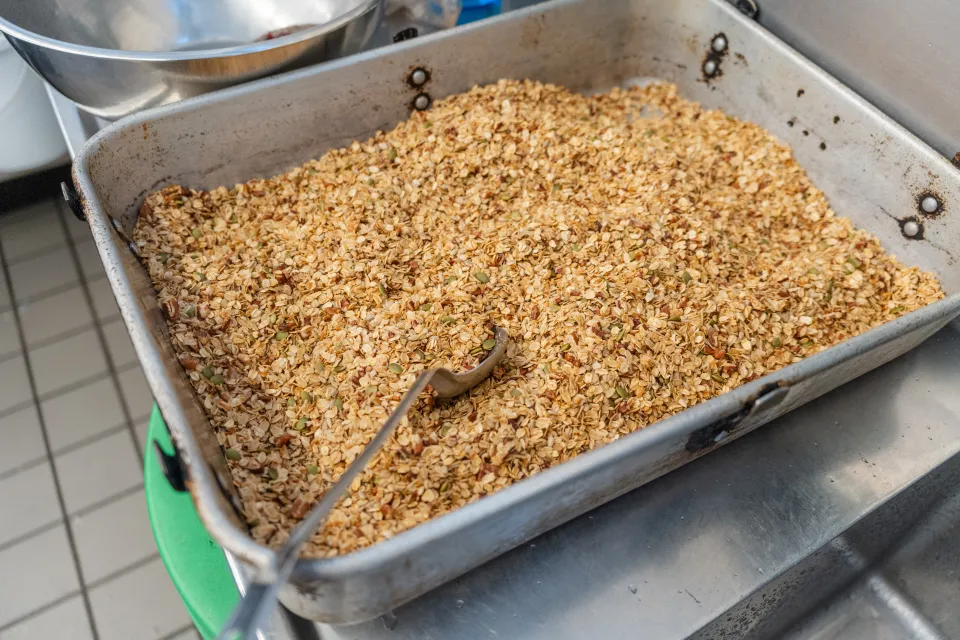
The crunchy granola had cranberries and pecans, but could also be made with raisins and no nuts.
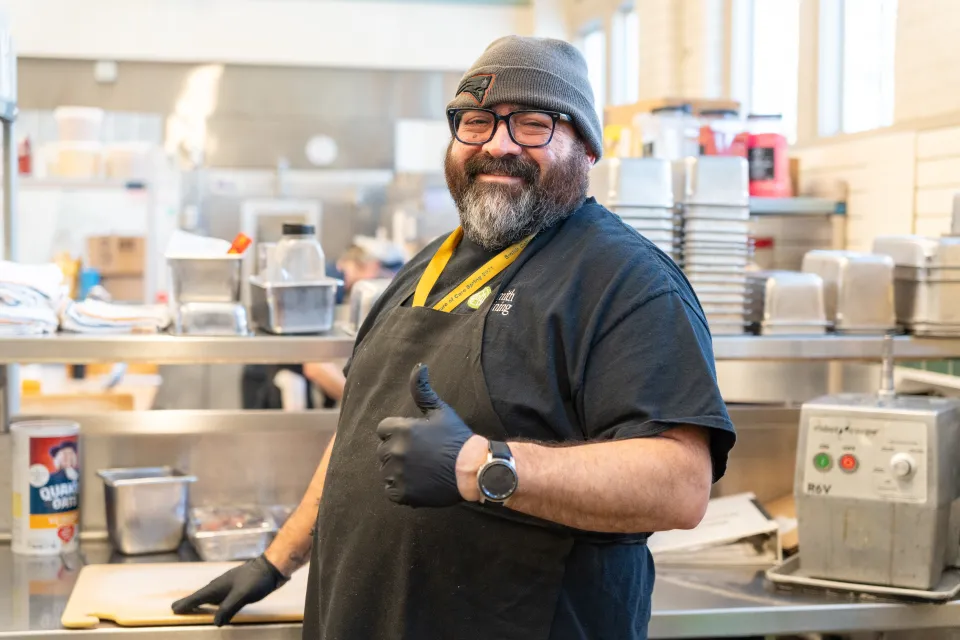
“I’ve always learned in this industry that you never know everything,” said Moe Torres, who works in Gillett. ”If you’re not learning, you’re not living.“
In the kitchen on January 17, Moises Moe Torres, a cook’s assistant, was calling “Behind, behind, behind!” as he moved across the kitchen with a hot pan of granola. Torres regularly prepares vegan and vegetarian dishes for the plant-based menu at Gillett House, so many of the Humane Society’s items were familiar to him, even if the recipes offered a new twist.
When Alqamoussi bent over the pan, Torres said, ”One difference I like about your recipes, chef, is the chia seeds at the end.” Alqamoussi nodded, smiling. ”Yeah, it helps with the nutrition.”
After a quick demonstration of vegan nacho sauce—made in a blender with potatoes and carrots but surprisingly faithful to the traditional neon yellow cheese dip—Alqamoussi gathered the staff together for more feedback. Chefs noted that one of the pancake batters had been too thick, the burrito needed a bit more cornstarch, and the mandazi needed to be rolled out a bit thicker.
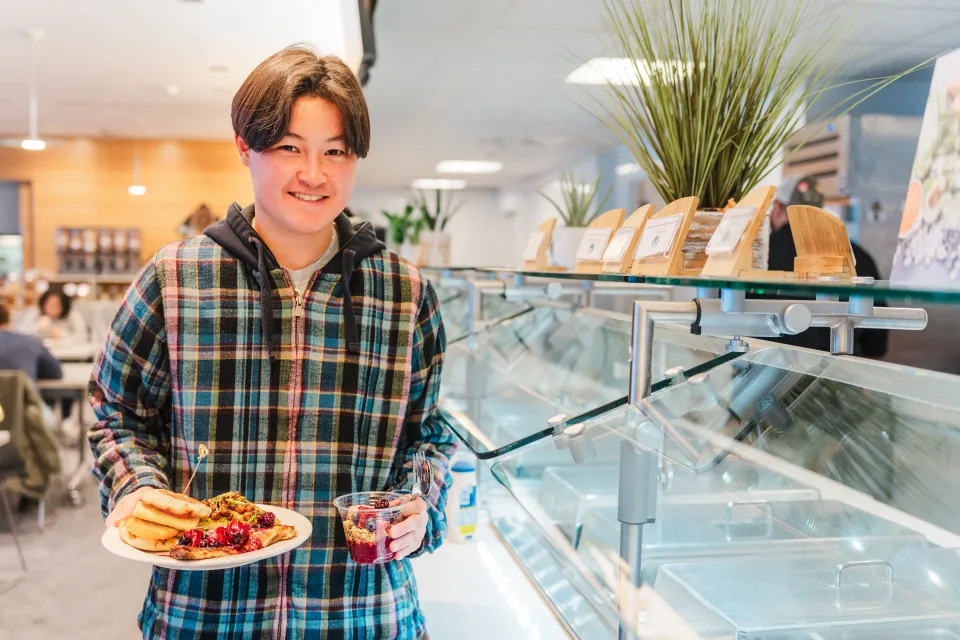
Students singled out the plant-based breakfast sandwich, tacos, avocado toast and mandazi as particular favorites.
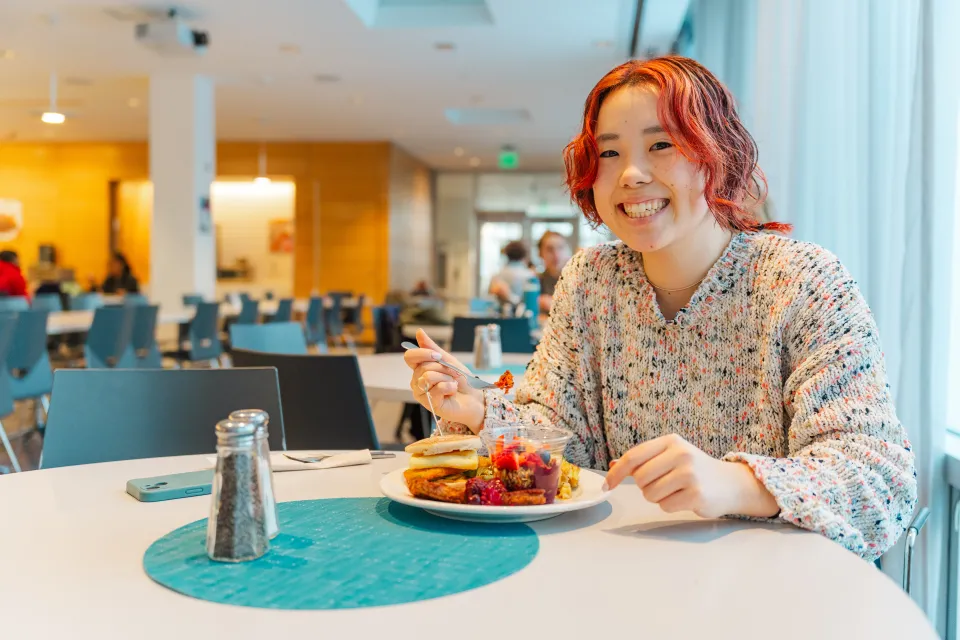
Joan Kobayashi ’26 has been drawn to the idea of plant-based dishes for ethical, environmental, and health reasons. “It’s nice to have a vegan option for breakfast especially,” she said.
By the next morning, these small kinks had been sorted out and Dining Services staff were unveiling the new recipes for student feedback. As students filed into the Cutter-Ziskind dining room for breakfast, Nang and Alqamoussi answered questions and pointed them to an online response form.
Some 38 students would eventually respond. The results were unanimous: Yes to more plant-based options. Students singled out the breakfast sandwich, tacos, avocado toast, and mandazi as particular favorites.
“I’m not vegetarian, nor do I intend to become vegetarian, but I love having non-meat options around too!” noted one respondent. Wrote another: “I have a dairy allergy, and it’s really hard to find decent options or not eat the same thing every day. Having more plant-based options would be phenomenal.”
Students were similarly enthusiastic in person. Before heading to her interterm class, Joan Kobayashi ’26 filled a plate with a breakfast sandwich, smoothie bowl, French toast, and shakshuka. While vegan options are limited in her native Japan, Kobayashi said at Smith she had been drawn to the idea of plant-based dishes for ethical, environmental, and health reasons. “It’s nice to have a vegan option for breakfast especially."
Celebrating her 18th birthday, Autumn Wilburg ’27 chose the French toast and chai-scented mandazi, declaring them “light, easy, simple.” The college “always tries to open up our horizons,” Wilburg said, “even when it comes to trying new food.”
Photographs by Jesse Gwilliam.